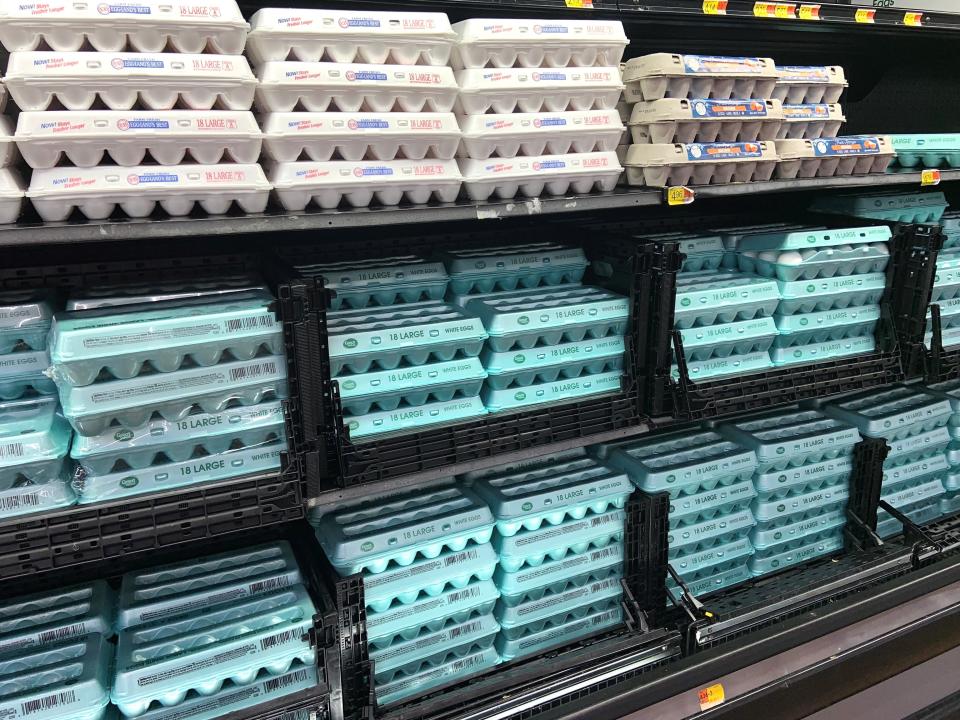Why are egg prices high in Ohio? Bird flu outbreak leads to 'perfect storm'

Ohio shoppers are feeling the effects of a bird flu outbreak that has affected millions of chickens across the country.
Bird flu, also known as avian influenza, is a highly contagious virus that can be fatal to poultry like chickens and turkeys. The current outbreak has been recorded in 47 states and has affected more than 57 million birds, according to the the Centers for Disease Control and Prevention, making it the largest bird flu outbreak in Unites States history.
This, combined with the holiday-driven increase in demand, and other factors has led to a nationwide surge in egg prices.
More than 43 million egg-laying hens have died since the outbreak began last February, and American egg inventories were down 29% at the end of December compared to the start of the year, the USDA said.
Grocery stores:A 'potential roadblock' for Kroger's acquisition of Albertson's
Why are egg prices in Ohio and the rest of the U.S. surging?
The USDA recorded six bird flu outbreaks in Ohio last year. The largest was at a commercial poultry flock in Defiance County in September, which affected over 3 million birds.
"Eggs are just like any other product in the grocery store. We've seen increased transportation prices due to increased fuel costs, packaging has increased and the labor is more expensive," Jim Chakeres, executive vice president of the Ohio Poultry Association, said. "You put the avian influenza on top of all these things ‒ it's like the perfect storm."
Data from the U.S. Bureau of Labor Statistics shows the price of eggs in December in the U.S. was up 60% from the previous year. The average price for a dozen large Grade A eggs was $1.93 in January 2022, but reached $4.25 last month, USA Today reported.
Ohio's egg supply has been impacted by the outbreaks, but increased biosecurity at farms and the fact that only one commercial flock has been affected has kept levels from dropping lower, Chakeres said.
Price check:Here's where you can get gas for under $3 around Greater Cincinnati

When will egg prices go down?
Chakeres said there's a "guarded optimism" that biosecurity measures and farmers restocking their hens could lead to more egg availability in Ohio soon. However, there are a few factors at play.
"(The flu) seems to be maybe tapering off, but we also have spring migration coming up with the wild birds, which are the No. 1 spreader of the disease," he explained.
The virus currently affecting commercial and backyard flocks is also different from previous flus and appears to have a longer-lasting impact, Chakeres said, meaning experts can't rely on data from past outbreaks to predict when this flu might die down.
"Farms that are affected are working diligently to restock their farms and repopulate to get the hens back in production to make sure we're producing plenty of eggs," he said. "The combination of that with the biosecurity, we're hoping, will help with the egg supply in the near future."
'It puts Cincinnati on the radar':Home playoff game could have $9M impact on region
Cincinnati shoppers turning to local, unaffected farms
There were no confirmed cases of bird flu in Hamilton or Clermont County in 2022, according to the USDA's list of detections, which was last updated Wednesday.
There are several local farms in Greater Cincinnati that sell eggs, some of which have seen an increase in sales since the outbreak.
Egg prices have not been affected at Gorman Heritage Farm, a nonprofit farm in Evendale. The farm has maintained its price, $6 for a dozen, and all of its hens are pasture-raised, with access to the outdoors and high quality feed.
"We have typically seen a lot of support from people who see that value, both nutritionally and ethically," Nicole Gunderman, executive director at the farm, said. "We have actually seen that (support) increase through this time period because people are now looking at how expensive eggs are in the grocery store and are more willing ‒ if they're gonna be spending that anyway ‒ to come to the farm and get the local, sustainably-raised ones."
Toncia Chavez, owner of ETC Produce & Provisions, which sells products at Findlay Market, said egg sales almost doubled last Saturday. The family-owned Clermont County farm with pasture-raised chickens has upped its egg supply to meet demand, but has not changed its price-per-dozen, which is $6.
Chavez said ETC has only increased its egg prices in the past to meet rising supply costs, and since that's not an issue right now, there's no reason to change them.
"I could increase my prices just because demand is high, but that doesn't create trust with my customers," she said.
Cincinnati shoppers can find more information about local growers on the Central Ohio River Valley website, including a directory of farms in the area.

How to protect yourself from bird flu
Bird flu viruses do not typically pose a threat to humans. One person who came into contact with infected birds did test positive for the disease, but has since recovered.
To minimize your exposure to bird flu, the CDC recommends avoiding contact with wild birds. If you do come into contact with wild birds, avoid touching your face and wash your hands with soap and water.
"There's really not a concern if you're not in contact with birds," Chakeres said. "And if you thoroughly cook chicken, turkey and eggs, you're going to be fine."
Can dogs get bird flu?
Dogs and cats that eat or come into contact with sick or dead birds can become infected with bird flu, the CDC says, so it's recommended to keep pets away from wild birds. However, the number of reported cases among non-bird species is low, according to the American Veterinary Medical Association.
This article originally appeared on Cincinnati Enquirer: Why are egg prices so high? What to know about egg shortage, inflation

 money
money 